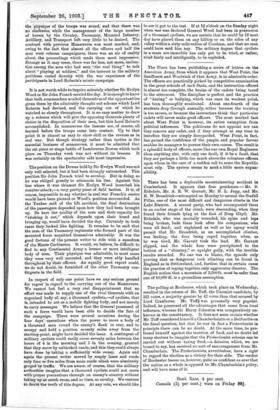In respect of only one point have we any serious
ground for regret in regard to the carrying out of the Manceuvres. We cannot but feel a very real disappointment that no effort was made to supply one of the rival Generals with an Organised body of, say, a thousand cyclists,—of cyclists, that is, intended to act as a mobile fighting body, and not merely to carry messages. We believe that the General possessed of such a force would have been able to decide the fate of the campaign. There were several occasions during the four days' operations when the power to move a body of a thousand men round the enemy's flank or rear, and to occupy and bold a position seventy miles away from the starting-point, might have decided the issue. A contingent of military cyclists could easily cover seventy miles between the hours of 4 in the morning and 5 in the evening, granted that they move by unblocked roads, and this they could always have done by taking a sufficiently wide sweep. Again and again the present writer moved by empty lanes and roads only four or five miles from main roads which were absolutely gorged by traffic. We are aware, of course, that the military authorities imagine that a thousand cyclists could not move With proper precautions through an enemy's country without taking up as much room, and so time, as cavalry. We venture to doubt-the truth of this dogma. At any rate, we should like
to see it put to the test. If at 12 o'clock on the Sunday night when war was declared General Wood had. been in possession of a thousand cyclists, we are certain that he could by 12 next day have placed them on any hilltop or on the sides of any valley within a sixty-mile radius of Corsham, and that no man could have said him nay. The military dogma that cyclists in a mass are immobile has only got to be tried, or rather, tried fairly and intelligently, to be exploded.














































 Previous page
Previous page